
"What's the Frequency, Kenneth?" is a song by American alternative rock band R.E.M. from their ninth studio album, Monster (1994). The song's title refers to an incident in New York City in 1986 in which two then-unknown assailants attacked journalist Dan Rather while repeating "Kenneth, what is the frequency?"
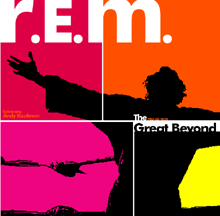
"The Great Beyond" is a song by American rock band R.E.M., written for the 1999 film Man on the Moon. It was released as a single the same year for support of the film's soundtrack album. On the soundtrack, there is some dialogue from the movie at the end of the track; meanwhile, the single version is a radio edit, with the bridge omitted.
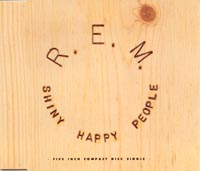
"Shiny Happy People" is a song by the American rock band R.E.M., released as the second single from their seventh studio album, Out of Time (1991). It features guest vocals by Kate Pierson of the B-52's, who also appears in the music video.

"Everybody Hurts" is a song by American rock band R.E.M. from their eighth studio album, Automatic for the People (1992), and released as a single in April 1993. It peaked at number 29 on the US Billboard Hot 100. The song fared much better on the US Cash Box Top 100, where it peaked at number 18. It also reached the top 10 on the charts of Australia, Canada, France, Iceland, Ireland, the Netherlands, and the United Kingdom. Its music video was directed by Jake Scott. In 2003, Q ranked "Everybody Hurts" at number 31 on their list of the "1001 Best Songs Ever". In 2005, Blender ranked the song at number 238 on their list of "Greatest Songs Since You Were Born".

"Man on the Moon" is a song by American alternative rock band R.E.M., released in November 1992 as the second single from their eighth album, Automatic for the People (1992). The lyrics were written by lead singer Michael Stipe, and the music by drummer Bill Berry and guitarist Peter Buck. The song was well received by critics and reached number 30 on the US Billboard Hot 100, number 17 on the US Cash Box Top 100, number 18 on the UK Singles Chart, and number one in Iceland. It remains one of R.E.M.'s most popular songs and was included on the compilations In Time: The Best of R.E.M. 1988–2003 and Part Lies, Part Heart, Part Truth, Part Garbage 1982–2011.
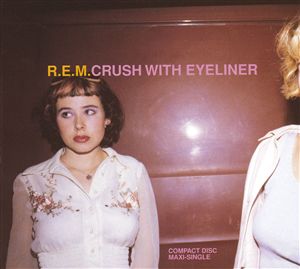
"Crush with Eyeliner" is a song by American rock band R.E.M., released by Warner Bros. Records as the fourth single from their ninth studio album, Monster (1994). Sonic Youth's Thurston Moore provides background vocals. Michael Stipe claims the song was inspired by the band New York Dolls, who, in his opinion, "knew how to exaggerate a song, to make it sound really sleazy and over the top." This was also one of the first songs that surfaced from Stipe after the writer's block that hounded him after the death of his friend, actor River Phoenix.

"Bang and Blame" is a song by American alternative rock group R.E.M. It was released as the second single from their ninth studio album, Monster (1994), on October 31, 1994 by Warner Bros. Records. The song was R.E.M.'s last to reach the top 40 on the US Billboard Hot 100, peaking at number 19, and was also their last number-one single on the Billboard Modern Rock Tracks chart. The single reached number one in Canada—R.E.M.'s only single to do so—and peaked inside the top 40 on the charts of Australia, Belgium, Finland, Iceland, Ireland, the Netherlands, New Zealand, and the United Kingdom.

"Strange Currencies" is a song by American rock band R.E.M. It was included on their ninth studio album, Monster (1994), and was released as the album's third single on April 18, 1995 by Warner Bros. Records. The song reached number nine on the UK Singles Chart and peaked at number 47 in the United States. Like "Everybody Hurts" on R.E.M.'s previous album, it has a time signature of 6
8. The song's music video was directed by Mark Romanek.

"Tongue" is a song by American rock band R.E.M., released on July 17, 1995 by Warner Bros. Records, as the fifth and final single from their ninth studio album, Monster (1994). The song was only released in the US, UK, and Ireland. In the song, lead singer Michael Stipe performs in falsetto; he has stated on several occasions that the narrator of the song is female. Stipe has also said the track is "all about cunnilingus".

"The Sidewinder Sleeps Tonite" is a song by American alternative rock band R.E.M. It was influenced by the song "The Lion Sleeps Tonight", both in the title of the song and through the song's opening refrain. The band used "The Lion Sleeps Tonight" as the B-side to this song. The song was released on R.E.M.'s 1992 album, Automatic for the People, and was later released as a single in February 1993, reaching number one in Iceland, number 13 in Ireland, number 17 in the United Kingdom, and number 29 in New Zealand.

"Leaving New York" is a song by American alternative rock band R.E.M. It was released as the lead single from the band's 13th studio album, Around the Sun (2004). Although it was not as heavily promoted as earlier singles, it reached number five on the UK Singles Chart, becoming their 11th and final top-10 hit there. However, the song failed to chart on the Billboard Hot 100, becoming the only lead US single from an R.E.M. studio album not to chart on the US Hot 100 besides "Cant Get There from Here" from Fables of the Reconstruction in 1985.
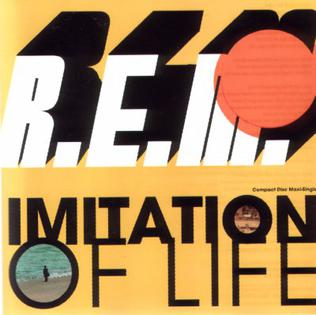
"Imitation of Life" is a song by American alternative rock band R.E.M. It was written by band members Peter Buck, Mike Mills, and Michael Stipe and produced by the band with Pat McCarthy for their 12th studio album, Reveal (2001). The track's title comes from Douglas Sirk's 1959 film of the same name and is used as a metaphor for adolescence and adulthood. One of R.E.M.'s most pop-influenced tracks, "Imitation of Life" has been described lyrically as "see[ing] through the puffed-up performance of a hopeful entertainer", as well as the enjoyment of love.
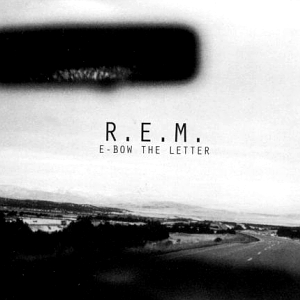
"E-Bow the Letter" is the first single from American rock band R.E.M.'s 10th studio album, New Adventures in Hi-Fi (1996). It was released on August 19, 1996, several weeks before the album's release. During the same month, R.E.M. signed a then record-breaking five-album contract with Warner Bros. Records. The song features American singer-songwriter and "Godmother of Punk" Patti Smith performing backing vocals. Smith was cited as a major influence by band members Michael Stipe and Peter Buck, and she also provided backing vocals for "Blue", the closing track on the band's final studio album, Collapse into Now, in 2011.

"Find the River" is a song by American rock band R.E.M., released on November 29, 1993 by Warner Bros., as the sixth and final single from the band's eighth album, Automatic for the People (1992). The song reached number 54 on the UK Singles Charts in December 1993. It did not chart in the US. "Find the River" was one of only three R.E.M. singles released in the 1990s to not make the Top 40 in Britain. The song's music video was directed by Jodi Wille.

"All the Way to Reno (You're Gonna Be a Star)" is a song by American rock band R.E.M. It was released on July 23, 2001 as the second single from the band's twelfth studio album, Reveal (2001). The single did not chart on the US Billboard Hot 100, but it did reach number 24 on the UK Singles Chart, number 31 in Italy, and number 34 in Ireland.
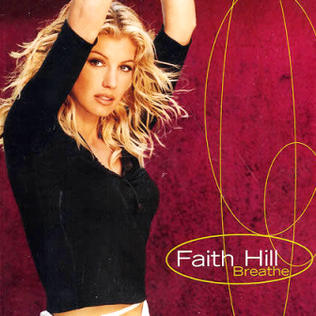
"Breathe" is a song written by Stephanie Bentley and Holly Lamar and recorded by American country music artist Faith Hill. Warner Bros. Records released it on October 4, 1999, as the first single from Hill's fourth album of the same name (1999). The song was produced by Byron Gallimore and Hill. "Breathe" became Hill's seventh number one on the Hot Country Songs chart in the United States, spending six weeks at number one. It also peaked at number two on the Billboard Hot 100 chart in April 2000. Despite not peaking at number one, it was the number-one single of 2000.

"Black Balloon" is a song by American rock band Goo Goo Dolls. It was released in June 1999 as the fourth single from the band's sixth studio album, Dizzy Up the Girl (1998), and reached number three in Canada, number 16 in the United States and number 23 in Iceland.

"Don't Wanna Fall in Love" is a song by Canadian singer-songwriter Jane Child. Released in January 1990 as the second single from her self-titled debut album, the single went to number two for three consecutive weeks on the Billboard Hot 100 from April 14 to April 28, 1990. In addition, a new jack swing remix of the song was produced by Teddy Riley and reached number six on the Billboard Hot Black Singles chart and number eleven on the Billboard Dance Club Play chart.

"Constant Craving" is a song written by Canadian singer-songwriter k.d. lang and Ben Mink, performed by lang and included on her second solo album, Ingénue (1992). The song was released in the United Kingdom in April 1992 and won lang a Grammy Award in the category for Best Female Pop Vocal Performance in 1993, as well as an MTV Video Music Award for Best Female Video.
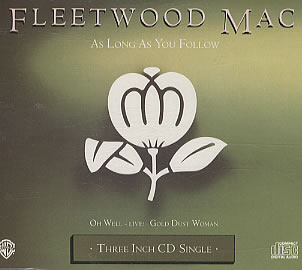
"As Long as You Follow" is a song by British-American rock band Fleetwood Mac. Performed by Christine McVie and written alongside her then-husband, Eddy Quintela, the song was one of two new tracks on the band's 1988 greatest hits album, along with "No Questions Asked". Lead guitarist Rick Vito singled out the guitar solo on "As Long as You Follow" as his best work with Fleetwood Mac.




















